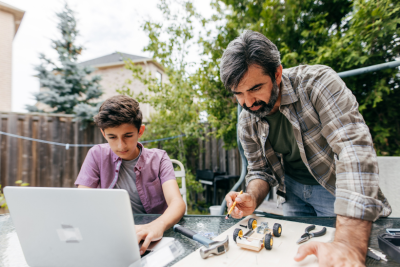Back to school is quickly approaching and as we squeeze in the fun summertime activities, we should also make time to talk to the young people in our lives about substance use. Research shows that substance use often starts in the teenage years, with 50% of teens reporting having tried an illicit drug by their high school graduation. Teens often feel social pressure or try substances as a way to impress friends or express independence. This pressure and vulnerability is often heightened in the fall as teens return to school and their friend groups.
Although sometimes difficult, engaging in open and honest conversations about tobacco, alcohol, and other substances is crucial in fostering a safe and informed environment for adolescents. Most kids do not want to disappoint the adults in their lives. The Partnership aims to provide valuable insights and practical suggestions for conversations that motivate youth to avoid use. Read on for tips on how to get the conversation started!
8 Conversation Starters to Build Resilience in Your Child

1. Establish an Open Communication Channel:
Building a foundation of trust and open communication is essential for successful conversations about substance use. Create a supportive environment where teens feel comfortable sharing their thoughts and concerns without fear of judgment. Show genuine interest in their lives, listen actively, and validate their feelings to encourage honest dialogue.
2. Educate Yourself First:
Before having these discussions with your teen, take the time to educate yourself about the various substances, their effects, and potential risks. Being well-informed will enable you to address any misconceptions and respond better to questions. Reliable resources, such as educational websites and local health organizations, can provide valuable information to enhance your understanding. Check out our ‘Get the Facts’ webpage to get started.


3. Choose the Right Timing:
Timing is crucial when initiating conversations about substance use. Pick a moment when both you and your teen are relaxed and focused. Avoid having these discussions in front of others, as it could make your teen uncomfortable and less likely to open up. Additionally, don’t wait until the last minute- such as when your teen is on their way to a party or event.
4. Take an Empathetic Approach:
Teens may feel defensive or apprehensive when discussing sensitive topics like substance use. Approach the conversation with empathy, avoiding a confrontational tone. Acknowledge their feelings and concerns, and emphasize that you are there to support them. Be curious rather than judgmental, and focus on building rapport. Building a strong foundation of trust will empower your teen to come to you with issues and concerns in the future.


5. Use Real-Life Examples:
Incorporate real-life examples and relevant news stories to illustrate the consequences of substance use (this can also include personal experience if you feel comfortable sharing). This approach can help teens better understand the potential risks and make informed decisions. Personalize your approach to what your teen could lose by engaging in risky substance use behavior (ie: college scholarships, attendance at events like prom and graduation, privileges to use the car, etc).
6. Encourage Critical Thinking:
Rather than imposing strict rules, encourage your teen to think critically about the choices they make. Ask thought-provoking questions, such as how they would handle a situation involving substance use or what strategies they can employ to resist peer pressure. By talking through probable situations before they happen, you’re helping your child be better prepared for whatever life throws at them.


7. Set Clear Boundaries and Consequences:
Teens require structure to feel safe. While promoting open communication, it’s crucial to establish clear boundaries and consequences for substance use. Be consistent and fair in enforcing these boundaries, emphasizing that they are in place for their safety and well-being. It’s okay to say, “I understand you may be in a situation where you are offered drugs, and I want you to know, I do not want you to use them. You can always come to me with any questions or concerns.”
8. Involve School and Community Resources:
Don’t hesitate to involve school counselors, teachers, or community organizations that focus on substance use prevention. These resources provide additional support and reinforce the importance of responsible decision-making. Many schools understand their critical role in preventing substance use and are actively working to create a culture that promotes acceptance and inclusivity. Learn more about how schools are cultivating these protective factors here.

When adults talk to kids about important topics like substance use and other risky behavior, we show them they matter, we care about their well-being and their future. By fostering open communication, empathy, and understanding, you create a safe and supportive environment for your teen to make informed choices and confidently face the new school year ahead. So as you drive your teen from one activity to the next, start the conversation. You won’t be disappointed you did.

